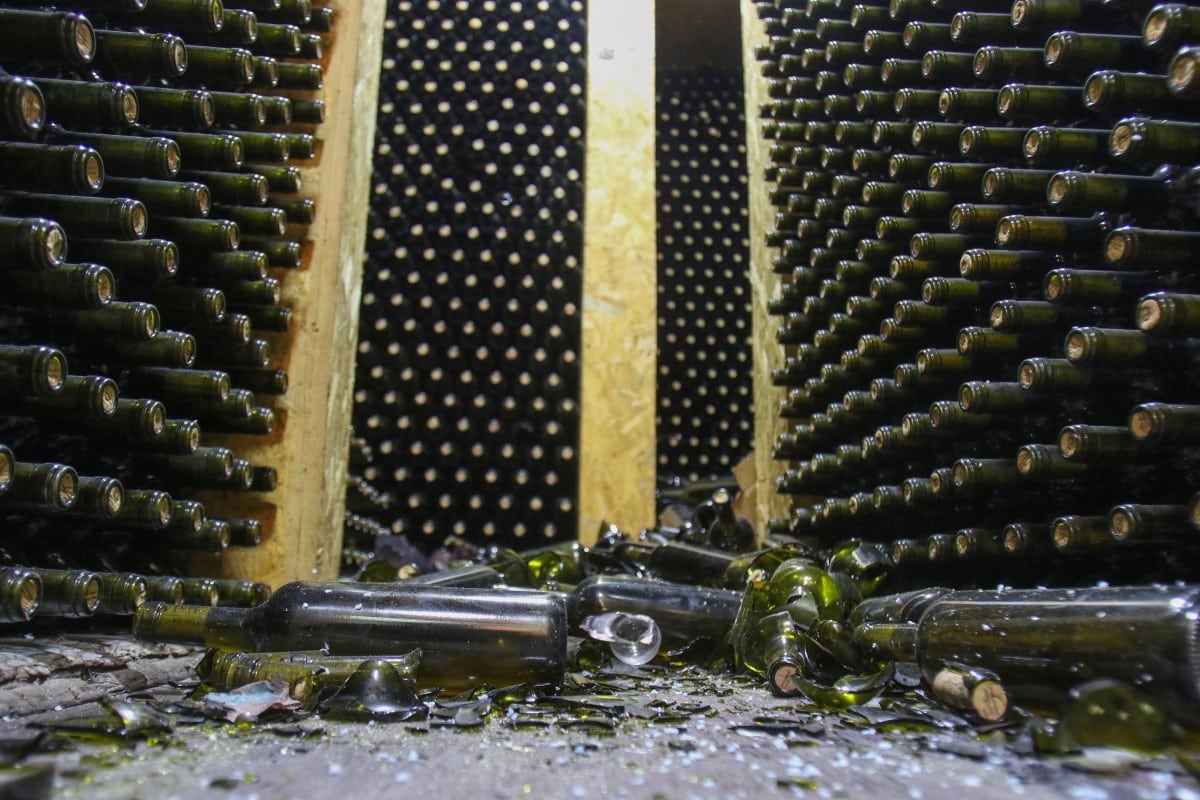
A picture taken on October 22, 2024, shows a view of the damage inside a winery that was partially hit in an Israeli airstrike that targeted a neighborhood in Rayak town in the Bekaa plain. Agence France-Presse
BEIRUT — The moment Israel’s strikes on Lebanon’s Bekaa Valley cease, Roland Abou-Khater straps a white flag to his truck, watches the sky for warplanes then whisks a harvesting team to near the firing line.
His vineyards in Lebanon’s wine heartland, where Hezbollah holds sway, have become a death trap since Israel last month shifted its focus from Gaza to its northern neighbor after nearly a year of cross-border fire.
“We are harvesting quickly and then scurrying away,” said Abou-Khater, whose Coteaux Du Liban winery is headquartered in the Christian-majority district of Zahle.
READ: Israel unearths Hezbollah’s web of tunnels in southern Lebanon
“It’s traumatizing,” the 29-year-old told AFP, describing the explosions and black smoke plumes that have disfigured the region and disrupted the usually joyous harvesting season.
The eastern Bekaa Valley, a vast agricultural area that accounts for the bulk of Lebanon’s world-renowned wine production, is one of the parts of the country hardest hit by recent Israeli strikes.
Israel says it is targeting Hezbollah positions in the area which borders Syria, and the air raids usually come without warning.
READ: War casts shadow over Lebanon’s ancient Baalbek
The Coteaux Du Liban winery itself has been spared attacks, but its vineyards lie adjacent to heavily targeted towns and villages.
“There are a lot of workers and truck drivers who are not ready to take the risk and go to these fields, so we are taking smaller teams, which doesn’t allow us the same level of efficiency,” said Abou-Khater.
“The plot that usually takes us one day to harvest is now taking us three or four.”
With 22 hectares of vineyard under production, Coteaux Du Liban usually produces 150,000 bottles per year.
“This year, the numbers will drop by 20,000 bottles because there are vineyards we can’t reach,” said Abou-Khater, who inherited the winery founded by his father in 1999.
Bombed winery
Many of the Bekaa’s other winemakers are also wrestling with heavy Israeli raids that have killed at least 1,634 people in Lebanon since all-out war erupted on September 23, according to an AFP tally of health ministry figures.
Among those vintners is Elias Maalouf, whose family started making wine in the Bekaa town of Riyaq more than a century ago.
Last month, an Israeli strike hit a winery that Maalouf built to honor the family tradition.
Chateau Rayak, formally launched in 2015, is now out of service, caught in the crossfire of a widening war that shows no signs of abating.
“I am not a fighter on the frontline,” said Maalouf, 42, lamenting the strike that shattered thousands of bottles, damaged wine cellars and destroyed infrastructure used to ferment and chill grapes.
Despite the heavy fire, Maalouf has stayed in Riyaq, hoping to salvage what he can from the winery’s remains.
He told AFP he was going to move 60,000 bottles to another location this week.
“People say Iran will finance reconstruction after the war, but will it rebuild a winery?” he asked rhetorically.
‘Shutdown mode’
The Bekaa hosts some wineries that predate the establishment of the modern republic of Lebanon in 1943.
Domaine des Tourelles, founded in 1868, is one of the country’s oldest.
Its founder Francois-Eugene Brun came from France and fell in love with the Bekaa Valley.
The winery has survived as many crises as the Lebanese state itself, including previous wars with Israel in 2006 and 1982.
“Unfortunately, this is not our first war, but I hope it will be our last,” said Emile Issa-El-Khoury, a managing partner in the winery.
The 43-year-old said Domaine des Tourelles has been spared attacks but some of its crops and vineyards are close to locations that have been targeted.
Some “farmers can’t even harvest the grapes”, he told AFP, adding that with most of his winery’s crop already picked, his problem would be sales.
“All the local economy is in shutdown mode so we’ve lost almost 90 percent of the local market,” Issa-El-Khoury said.
He pushed back against attempts to paint the Bekaa as a purely Hezbollah-dominated area.
“The Bekaa Valley is like all regions of Lebanon, it is very diverse,” he said.
“You have strongholds of Hezbollah but you have other regions that are completely out of this trend.”